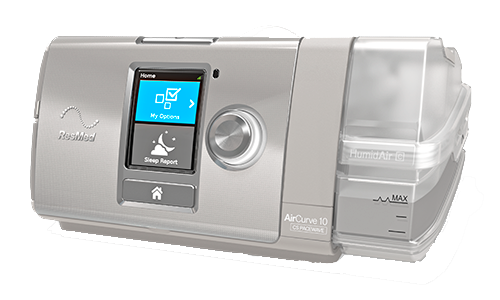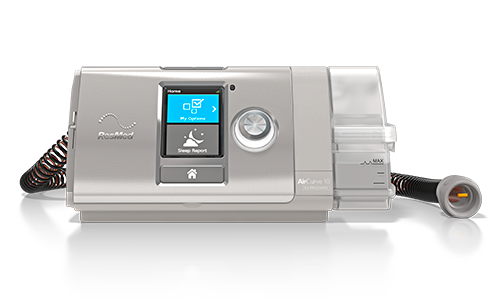Show me the way to...
txt
Show me the way to...
The AirCurve 10 CS PaceWave is an adaptive servo-ventilator specifically designed to treat patients exhibiting central sleep apnea (CSA), mixed sleep apnea and periodic breathing, with or without obstructive sleep apnea. In central sleep apnea, normal breathing stops because communication between the brain and the body has been affected. CSA is different to obstructive sleep apnea, which is caused by a blockage in the upper airway. Your clinician will advise you if you have CSA. Some people have both types of sleep apnea and this bilevel machine will treat both.
Featuring the most clinically studied ASV algorithm – PaceWave – the machine also features a built-in HumidAir™ humidifier and built-in wireless connectivity**, so your healthcare professional can stay more connected to your therapy progress than ever before.
**Wireless communication depends on network availability

ASVAuto mode adapts to your ventilatory and upper airway stability needs on a breath-by-breath basis. By treating central breathing disorders with auto-adjusting pressure support, and upper airway obstruction with auto-adjusting expiratory positive airway pressure (EPAP), the machine rapidly stabilises breathing and blood gases helping improve sleep quality.1,2

In ASV mode, the EPAP can be manually titrated to set the optimal fixed EPAP to keep your upper airway open.
CPAP & APAP Machines for Sleep Apnea
Accessories
| AirCurve 10 CS PaceWave | |
|---|---|
| CPAP | Right |
| ASV | Right |
| ASVAuto | Right |
| Easy-Breathe waveform | Right |
| TiControl | |
| Trigger and cycle | |
| Climate Control | Right |
| Enhanced Climate Control Auto | Right |
| Vsync leak management | Right |
Morgenthaler TI, Gay PC, Gordon N, Brown LK. Adaptive servoventilation versus noninvasive positive pressure ventilation for central, mixed, and complex sleep apnea syndromes. Sleep. 2007;30(4):468-475.
Brown SE, Mosko SS, Davis JA, Pierce RA, Godfrey-Pixton TV. A retrospective case series of adaptive servoventilation for complex sleep apnea. J Clin Sleep Med 2011;7(2):187-195.
©2000-2019 ResMed. All rights reserved.